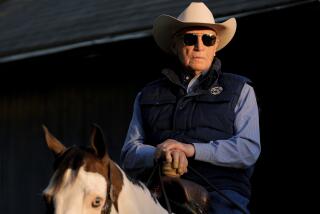Award Honors Jockey’s Courage
- Share via
Only someone with the unbending resolve--and gallows good humor--of jockey Dean Kutz could have endured what he has been through. Kutz once broke his back in two places when a filly slammed him into the rail at a track in Omaha, but that was the easy part.
Kutz’s hands were badly damaged by severe frostbite when he was a child; he lives off a kidney that a sister gave up 15 years ago; and last year he lost his larynx and his voice after undergoing surgery for throat cancer. But he talks about riding again someday, and somehow can joke about the battery-powered voice box that amplifies the only speech he has. Conversation with Kutz brings a resonating echo, a disarming sound until your ears catch up with his rhythms. He could plead guilty to impersonating a Martian.
Well-meaning, far-from-rude people have hung the phone up on Kutz, convinced he’s a crank instead of a legitimate caller.
“That kind of thing doesn’t bother me,” Kutz said. “I understand. But there are some big advantages to this box. You know how you always get those calls in the evening, people trying to sell you things? A couple of words from me and they hang up right away. I never have any trouble getting rid of them.”
Kutz and his mother, Marlys Kutz, who reared eight daughters and four sons, will be at Santa Anita on Sunday, when her son is honored as the 52nd winner of the George Woolf Memorial Jockey Award, named after the legendary rider who died from a spill at the track in 1946. In a nationwide vote by jockeys, Kutz outpolled the three other riders on the ballot.
“It was one great honor to have been nominated,” Kutz said, “and it’s another great honor to get elected. It means so much to me because of the people who did the voting. It’s a very emotional thing to be recognized by your peers. It’s nice that they didn’t forget me.”
Kutz, who rode his first winner in 1972, has ridden in 21,354 races and won 2,778. He has been aboard horses that have earned $32.5 million. About a year ago, Kutz was having trouble breathing, and the day after he rode in race No. 21,354, on Feb. 20, 2000, at Turfway Park in Florence, Ky., he went to see a doctor.
“I thought I had bronchitis,” Kutz said. “But the diagnosis was cancer. And they told me I had waited too long to be treated.”
A second opinion was no better. For the first two months after the surgery, which was done on March 21 last year, Kutz had tubes running from his throat to his stomach. He couldn’t talk and there was no room to install the voice box.
“I had to write everything out,” Kutz said. “That wasn’t such a good deal. I was a terrible speller.”
Kutz’s mother and her husband, who died of lung cancer five years ago, raced horses at small tracks in Canada when their son started riding.
“Dean is a super-nice person,” a proud Marlys Kutz said this week from North Dakota. “I’m not saying that just because he’s my son. We’re so thrilled that he’s getting this award.”
The 44-year-old Kutz was born in rural Harvey, N.D. When he was 2, and being looked after by a baby-sitter, a furnace exploded and a bad fire broke out in the family home. The blaze chased everybody out of the house. The nearest neighbor was a mile away and the temperature, with the windchill, was 40 degrees below zero. The baby-sitter, Kutz and two older sisters were forced to walk that mile or freeze to death while the fire raged. On the road to the next house, young Dean Kutz kept falling down. He kept losing his mittens. By the end of their journey, Kutz had suffered severe frostbite and exposure.
Cliff Guilliams, who works for the Daily Racing Form in Kentucky, remembers the first time he met Kutz.
“We shook hands,” Guilliams said, “and I thought, ‘My God, his hands have been through a meat grinder.’ That’s how bad that cold had affected them when he was a little boy. His hands were barnacled like some ancient mariner.”
A rider communicates with his horses through his hands. Kutz has no frame of reference. They’re the only hands he has known. They’ve been good enough to carry him to more than 2,700 wins.
The first of those came at Marquis Downs, a bush track in Canada. He went from small Canadian tracks to Ak-Sar-Ben in Nebraska and back again, before settling in the United States to stay in 1979. Much of his early U.S. success came in the 1980s, while riding horses for trainer Kathy Walsh at Canterbury Downs in Minnesota.
“Winning a lot of races at Canterbury gave me the confidence to try to make it in Kentucky,” Kutz said.
Kutz had been born with only one kidney, which began to fail in 1984. On Jan. 18, 1985, Kathy Kutz Zink, an older sister by a year and a half, donated one of hers.
“It was an identical match,” Dean Kutz said. “She was very courageous. She was raising her four children by the time she did this. She’s been normal ever since, and I have also been trouble-free.”
Well, no troubles with the kidney, at least. After the transplant in 1985, Kutz was told he’d never ride again. He stayed in the game by working in the racing office at Canterbury, a track that had just opened. Nine months after the transplant, toward the end of the season at Canterbury, he was riding again.
“Dean is a most special guy,” said Walsh, who now trains at Santa Anita. “He was very neat on a horse and had a beautiful work ethic. The race I remember best with him at Canterbury was the win with my filly Turbo Launch. We beat Lost Kitty, a real good filly trained by Wayne Lukas, that day.
“Dean got along with everyone and was very respected. It’s unusual, the way things work around a racetrack, but you’ve never heard one condemning word about him.”
Kutz is one of only eight riders to win five races on a card at Turfway Park. He has won two riding titles at the track near Cincinnati, leading the winter-spring standings with 62 wins. Going into the current season, he had won 12 stakes at Turfway, good for an eighth-place tie on the career list.
The popular assumption is that Kutz has again reached his riding Waterloo. He isn’t buying.
“If Dean says that he’ll ride again,” his mother Marlys Kutz said, “then I have all the faith in the world that this is what he’ll do.”
Kutz and his good friend Nancy Baker run a farm in Versailles, Ky., where they board horses, break yearlings and prepare horses for sales.
“Without Nancy,” Kutz said, “I’d never have been able to keep the place going.”
Kutz has been doing some pleasure riding and he ponies horses at the farm. His waist is 27 inches around and his weight, 112 pounds, is almost the same as it was during his riding days.
“I want to return to what I do best,” he said. “If I wanted to, I could start galloping horses tomorrow. But I’ll know when the time is right for a comeback. I don’t want to come back and ride one or two days and then that will be it. I want to come back to stay.”
Whether Kentucky would license him is an issue that’s down the road. Kentucky once had a problem approving a jockey who was sightless in one eye. Walter Blum, now a steward in Florida, went into the Racing Hall of Fame after riding 4,382 winners with just one good eye. But there’s no record of a jockey riding without a voice.
“I never talked to my horses anyway,” Kutz said. “Not many jockeys do. The time you might really need your voice is when it gets tight, when you might have to shout to another rider that you’re coming through.”
If there is bitterness about a lifetime of bad luck, it doesn’t show.
“It all started when I was 2, and it’s still going against me when I’m 44,” Kutz said. “I accept it all each and every day. I’ve still managed to have a very successful career. It might not be a Chris McCarron-type career, but it’s been very successful.”
Kutz was asked if it wouldn’t have made more sense if at least some of these misfortunes had happened to someone else.
“No, I can’t say that,” he said. “It’s good they happened to me instead of somebody else. Because I’m strong. I can work my way through these things. I can deal with them.”
More to Read
Go beyond the scoreboard
Get the latest on L.A.'s teams in the daily Sports Report newsletter.
You may occasionally receive promotional content from the Los Angeles Times.










